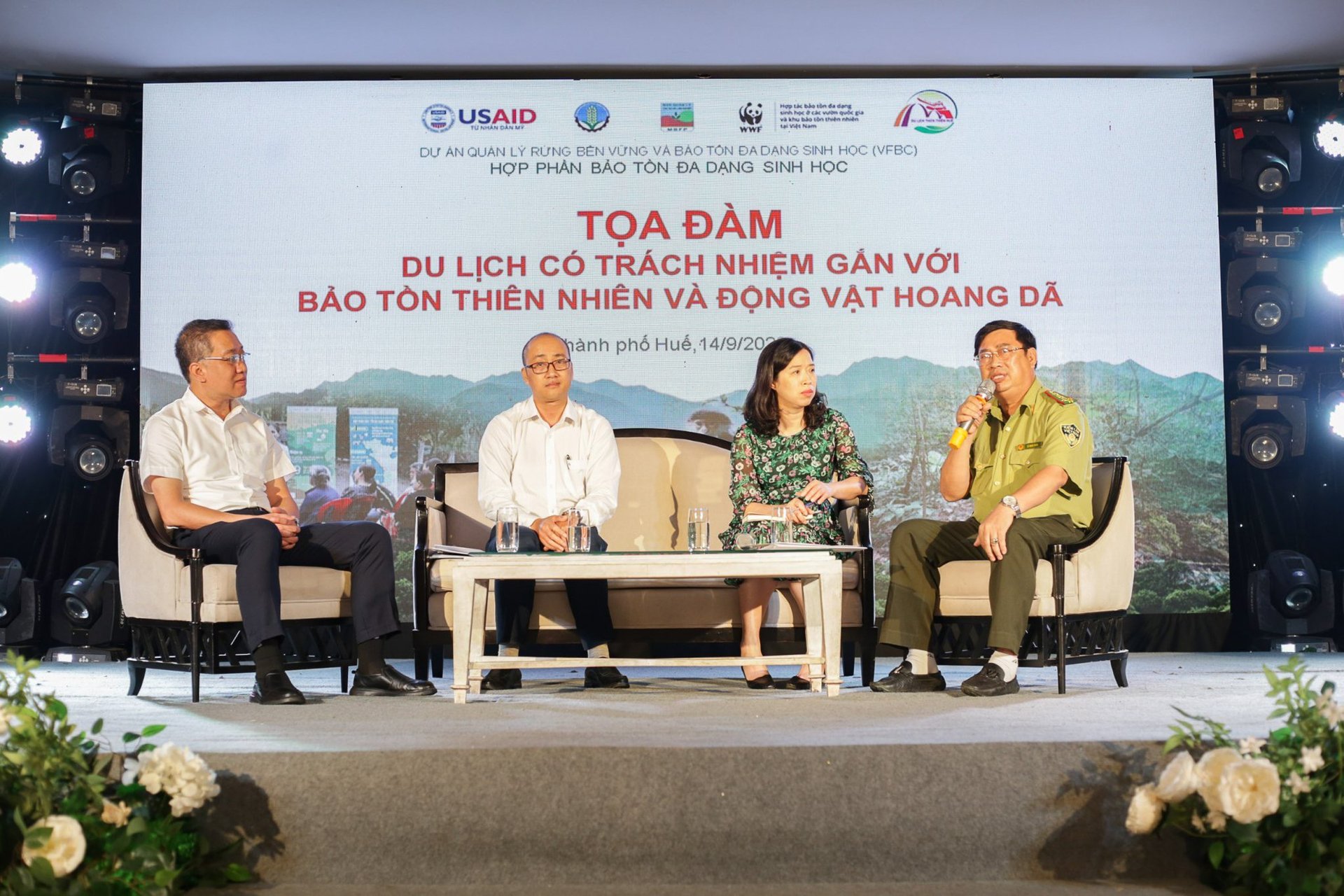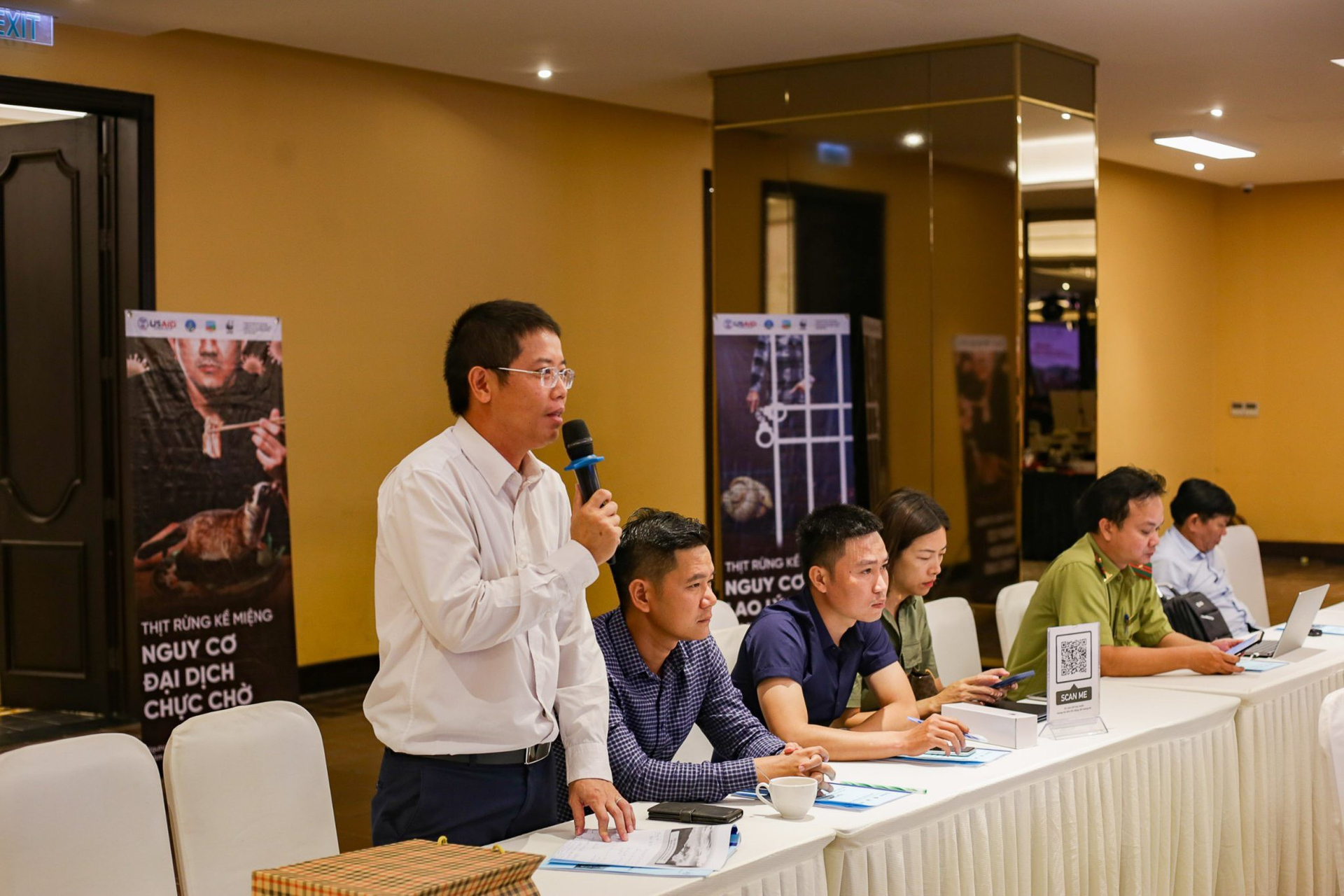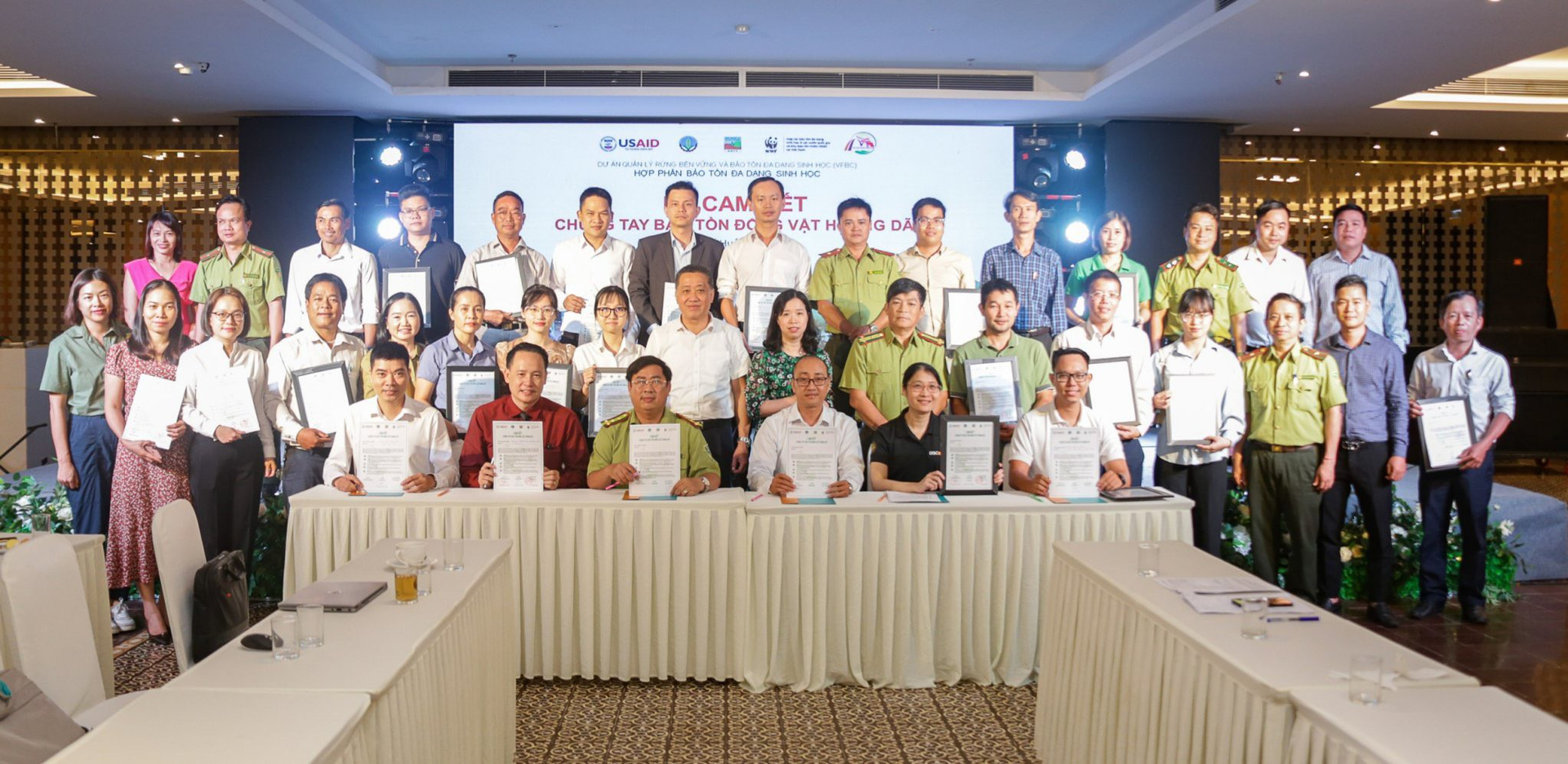November 26, 2025 | 22:09 GMT +7
November 26, 2025 | 22:09 GMT +7
Hotline: 0913.378.918
November 26, 2025 | 22:09 GMT +7
Hotline: 0913.378.918

The panel discussion received several contributing ideas from the forestry protection, tourism, and private sectors operating in Thua Thien Hue province. Photo: CD.
Thua Thien Hue province's Department of Forest Protection, recently collaborated with the province's Department of Tourism and the World Wide Fund for Nature in Vietnam (WWF-Vietnam) to organize a panel discussion on "Responsible Tourism in Nature and Wildlife Conservation."
This event was supported by the Biodiversity Conservation Partnership and the Sustainable Forest Management and Biodiversity Conservation (VFBC) Project funded by the United States Agency for International Development (USAID). The discussion aims to raise awareness and understanding among tourism agencies regarding responsible tourism in relation to environmental conservation. Additionally, it aims to promote inter-sectoral collaboration between the forestry protection, tourism, and private sectors to reduce the illegal consumption of wildlife products.
According to the Vietnam National Administration of Tourism, ecotourism activities in special-use forests attract over two million visitors to Vietnam every year, generating revenues exceeding 100 billion VND. Consequently, these activities have contributed significantly to local economic growth.
However, the rapid and uncontrolled development of tourism in select areas has resulted in negative impacts, including increased environmental pressure and overexploitation of tourism resources, leading to pollution and environmental degradation.

Multiple statements made during the event emphasized the need to influence certain client segments, including tourists, in order to reduce demand for the consumption of wildlife products. Photo: CD.
According to Mr. Hoang Phuoc Nhat, Deputy Director of Thua Thien Hue province's Department of Tourism, the results of the survey on the consumption of wildlife products conducted by WWF in 2021 and 2022 showed that approximately 90% of the wildlife meat production output was delivered to consumers in surveyed areas through restaurants and small retail outlets. Most notably, tourists are among the customer groups who must be influenced to reduce the demand for the consumption of wildlife products.
The survey also revealed several limitations that face the law enforcement against illegal wildlife hunting and the coordination between law enforcement agencies, local governments, and relevant departments. A portion of tourists to Vietnam in recent years have begun purchasing products sourced from wildlife.
As a result, it is essential to strengthen awareness campaigns and implement measures to protect wildlife in combination with the development of tourism.
With support from the USAID through the Biodiversity Conservation Partnership, the Forest Management Board, WWF-Vietnam, and their partners are collaboratively implementing various programs and initiatives for biodiversity conservation. These initiatives include improving the policy framework and policy enforcement, developing sustainable livelihoods for local communities in buffer zones of national parks and conservation areas, and enhancing communication to raise awareness and reduce the demand for products sourced from forest wildlife and wild birds.

Participants of the panel discussion signed a joint commitment to protect wildlife. Photo: CD.
According to Mr. Le Ngoc Tuan, Director of Thua Thien Hue's Department of Forest Protection, the panel discussion aims to raise awareness and understanding among tourism agencies regarding responsible tourism in relation to environmental conservation. It also seeks to promote inter-sectoral collaboration between the forest protection, tourism, and private sectors to reduce the illegal consumption of wildlife meat.
As part of the event, nearly 100 representatives from tourist destinations, museums, travel agencies, and several high-standard restaurants in Thua Thien Hue province signed a joint commitment to conserve the local wildlife. The stakeholders are aware of the importance of wildlife in preserving the ecosystems, ensuring sustainable human development, and complying with legal regulations. Representatives from relevant government agencies have attended and witnessed the commitment signing of the aforementioned parties.
Biodiversity Conservation Area
The Biodiversity Conservation Area (BCA) is part of the Sustainable Forest Management and Biodiversity Conservation Project funded by the United States Agency for International Development. Accordingly, the project has been implemented since July 2020, with an expected end date in June 2025. The BCA aims to maintain and enhance the quality of forests in addition to ensuring the stability of wildlife populations in Vietnam's provinces with high conservation value.
The project's objective is to focus on fourteen Special-Use Forests and seven Protected Forests. Additionally, it acts as a bridge for forest management agencies across the regional landscape to maintain forest cover and connect habitats in order to protect unique and endangered wildlife species in Vietnam.
Translated by Nguyen Hai Long
/2025/11/26/3627-4-082628_818.jpg)
(VAN) From a small café on the red basalt highlands, Le Van Hoang started a business with clean coffee, building Enjoi Coffee into a symbol of organic agriculture in the Lam Dong plateau.
/2025/11/25/0045-1-135246_13.jpg)
(VAN) Ca Mau is researching a model of sea-encroaching embankments combined with viaducts and logistics service zones, aiming both to prevent erosion and create land funds for marine economic development.

(VAN) The information was shared at the seminar 'Urban Agriculture - Solutions for Developing Green Spaces,' organized by the Kinh te & Do thi Newspaper and the Biotechnology Center of Ho Chi Minh City.
/2025/11/19/4141-2-132831_216.jpg)
(VAN) One of Japfa's outstanding solutions is implementing digital transformation and artificial intelligence (AI) to optimize operations, enhance productivity, and advance sustainable development.
/2025/11/19/4847-1-093540_448.jpg)
(VAN) The Gia Lai Provincial People’s Committee had a working session with the delegation of the U.S. Department of Agriculture, the State of Idaho, and representatives of the State's leading enterprises.

(VAN) Ca Mau has a sufficient foundation to become a strong regional aquaculture center, where production integrates the economy, the environment, and the lives of the people.

(VAN) SEIKI Group envisions itself as a pioneer in the ‘dual transformation’ of digital technology and green industry, standing alongside the Government and Vietnamese businesses in their pursuit of sustainable development.